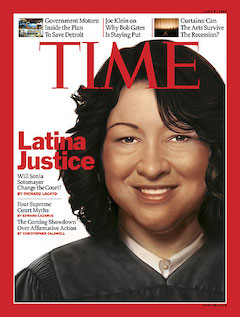
Sonia Sotomayor (b. 1954). A distinguished Associate Justice on the Supreme Court of the United States. Nominated by President Barack Obama in 2009, Sotomayor made history as the first Hispanic and the third woman to serve on the nation’s highest court.
She was born in the Bronx, New York, to Puerto Rican-born parents, and her early life was marked by perseverance through adversity—her father died when she was young, and her mother worked long hours to support the family. Excelling academically, Sotomayor graduated summa cum laude from Princeton University and earned her law degree from Yale Law School, where she served as editor of the Yale Law Journal.
Early Career and Federal Judicial Service
After law school, Sotomayor began her career as an Assistant District Attorney in New York County, prosecuting criminal cases and gaining a reputation for diligence and integrity.
In private practice, she handled international commercial litigation before her appointment to the U.S. District Court for the Southern District of New York in 1992—a nomination made by President George H.W. Bush.
She was then elevated to the U.S. Court of Appeals for the Second Circuit in 1998, serving with distinction and authoring several important opinions in areas ranging from employment discrimination to constitutional law.
Supreme Court Nomination and Tenure
President Obama nominated Sotomayor to the Supreme Court in 2009. Upon confirmation, she became the 111th justice and brought lived experience and a dedication to fairness and diverse perspectives to the bench.
Notably, Sotomayor has contributed significantly to discussions around race, gender, and economic justice, and consistently advocates for equal protection and robust procedural rights. Her powerful dissents—especially in cases involving civil rights and the rights of minorities—have underscored her commitment to justice for all.

Advocacy and Impact
Sotomayor is widely celebrated for her openness, authenticity, and ability to connect with broad audiences.
She frequently speaks about the importance of inclusivity and cultural heritage, inspiring generations to value education and community.
Her memoir My Beloved World offers a candid reflection on her journey and perseverance.
Sotomayor was part of pivotal decisions, including the ruling that legalized same-sex marriage in all 50 states and recent dissenting opinions highlighting the ongoing need for LGBTQ+ protections.
She remains a powerful voice for equity and the dignity of all individuals, challenging the Supreme Court to recognize and remedy discrimination wherever it exists.
Honors, Media Coverage & Legacy
Sotomayor’s story has been recognized globally, appearing on the cover of Time Magazine (June 8, 2009), which featured her as a symbol of progress and a historic appointment to the Supreme Court. Numerous institutions honor her as a trailblazer for the Latinx and wider American communities, emphasizing her influence both on and off the bench.
Professional & Inclusive Language
In line with Sotomayor’s values, it is essential to use inclusive language that avoids unnecessary gender specification. Terms like “chair,” “firefighter,” and “salesperson” are preferred, reflecting equality and avoiding gendered connotations, especially in legal and professional discourse.